Plenty of elite managers have been moving around of late, or deciding they need a break, but who are the best around right now in the men's domestic game in Europe? This list ranks the top 50, covering legends approaching the latter stages of their careers, rising stars just breaking through and everything in between.
How did you go about compiling the top 50?
An initial group of 70-odd names was narrowed down to 50 before I brought together a host of people working in the football industry -- coaches, sporting directors, CEOs and chief scouts -- for added input.
In an effort to emulate how professional clubs often draw up a long list when considering a new hire, the final 50 have been rated on six attributes from which the total score constitutes the position.
• Coaching acumen: The ability to apply coaching principles to a match setting, physical preparation and in-game management.
• Style: The attractiveness of the footballing style. Entertainment value is paramount here, as is a manager's capability to dictate the proceedings of a game in a proactive (as opposed to reactive, i.e,. play on the break) manner. Inevitably, an attacking style will produce a higher score.
• People management: Motivational skills and the capacity to get maximum performance out of a squad. The degree to which players appear to respond to and "play for" the manager.
• Communication: The extent to which a manager is capable of instilling trust in their "project" internally, to club directors and players, and to the outside world (media, supporters). Their expertise of conveying a message clearly, through well-chosen words and PR skills.
• History/achievements: Success and results. Though trophies are the main currency of achievement in football, other accomplishments such as winning promotion, getting teams out of relegation trouble, taking unfancied sides into Europe or overperforming on small resources count too.
• X factor: Ability to surprise and come up with new ideas. The likelihood of being considered for top jobs in the future. The resilience to bounce back from a poor run of results.
Notes:
• Only managers with at least one full season in charge of a first team were considered (Roma's Daniele De Rossi misses out), while those who have been out of work for two years or more (Zinedine Zidane) were excluded. No national team managers were included as it's not a like-for-like comparison with the domestic game.
• To keep the ranking as current as possible, past achievements (and X factor, which is arguably the least tangible category) are given less emphasis with ratings out of 10 instead of 20.
• When managers' total scores are equal, the score for past achievements decides the rank. If still level, X factor breaks the tie.
• The terms "manager" and "head coach" have been used casually throughout the piece, but if you want my definition of either role, click here.
• All stats are correct as of Aug. 12.
Steve Nicol, Don Hutchison and Frank Leboeuf explain the attributes that a successful manager needs to have.
The List
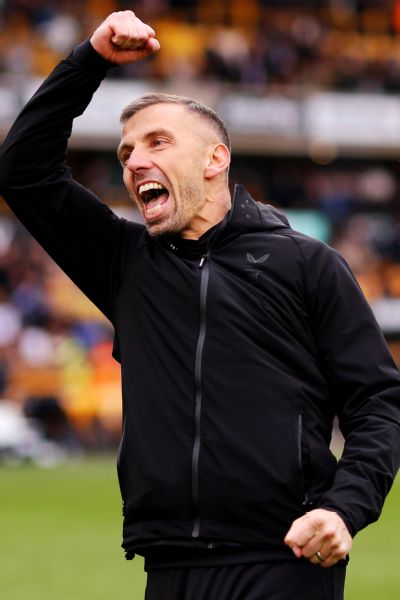
50. GARY O'NEIL, 41, Wolverhampton Wanderers
Coaching acumen: 11/20
Style: 11/20
People management: 12/20
Communication: 11/20
History/achievements: 1/10
X factor: 4/10
Total: 50/100
O'Neil is still an apprentice in football management compared with most on this list -- he got his first job as caretaker at AFC Bournemouth less than two years ago -- but his results have been more than adequate. Despite landing the Cherries job permanently and keeping the club in the Premier League, he was sacked at the end of the 2022-23 season, only to land his next position two months later.
Having to overcome spending cuts and an exodus of top players such as Matheus Nunes and Rúben Neves, O'Neil's side was fun to watch as it was organised on the break last season, utilising fast wide players and smart movement to create goal-scoring opportunities. Always well-prepared and with a fluent approach to formations -- defending in a classic 4-4-2 and attacking in a 3-4-3 shape -- O'Neil regularly adapts his tactics and is able to find opponents' vulnerable spots as the game progresses.
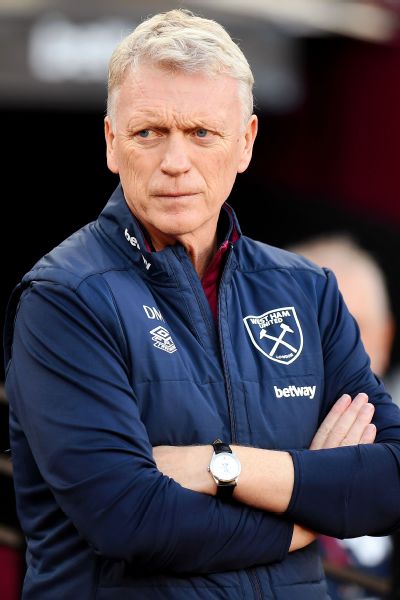
49. DAVID MOYES, 61, Unattached
Coaching acumen: 12/20
Style: 9/20
People management: 13/20
Communication: 12/20
History/achievements: 3/10
X factor: 2/10
Total: 51/100
Moyes might be best known for failing to do the impossible and replace the legendary Sir Alex Ferguson at Manchester United -- he was sacked after eight months -- but he built his career at Preston North End and Everton before having to rebuild it again at Real Sociedad, Sunderland and West Ham after his spell at Old Trafford.
Arguably, his footballing style is starting to drift out of fashion. He's not one to experiment with formations -- largely staying loyal to his 4-2-3-1 -- or tactical trends. Moyes' direct, reactive football might not have always enthused the West Ham fans, but the fact that he took the club to a top-10 finish in three out of the past four seasons, and won the 2023 Europa Conference League, is impressive. The Scot has an ability to get steady performances out of any squad and, while the elegance of his football can be debated, has managed to introduce flair players (Mohammed Kudus, Lucas Paquetá) into his teams.
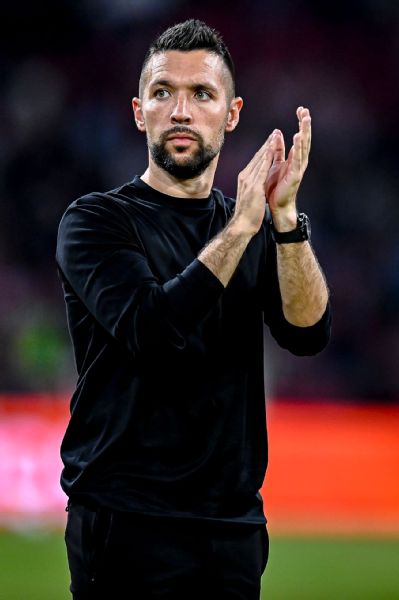
48. FRANCESCO FARIOLI, 35, Ajax
Coaching acumen: 11/20
Style: 11/20
People management: 12/20
Communication: 11/20
History/achievements: 1/10
X factor: 6/10
Total: 52/100
With just three years as a manager under his belt, the 35-year-old Farioli has followed an intriguing career path. After working as a goalkeeping coach under Roberto De Zerbi at Sassuolo and Benevento from 2017 to 2020, he was given a chance as an assistant at Turkish side Alanyaspor before taking over the top job at Fatih Karagümrük in 2021. He then returned to lead Alanyaspor for two years.
Farioli's reputation as a deep, philosophical thinker gained momentum while he was in Turkey and his quirky -- and mildly eccentric -- personality caught the eye of Ligue 1 side Nice, who helped him get his UEFA pro license. Predominantly sporting a 4-3-3 formation, with narrow full-backs creating overloads in the final third and keeping things compact in central areas, Nice conceded only 29 goals last season to finish fifth.
In May, the Italian was appointed by Ajax, becoming their first foreign coach in nearly three decades, no doubt partly down to the fact that his passing style seemed a good fit (Nice made the third-most passes in Ligue 1, finishing fifth).
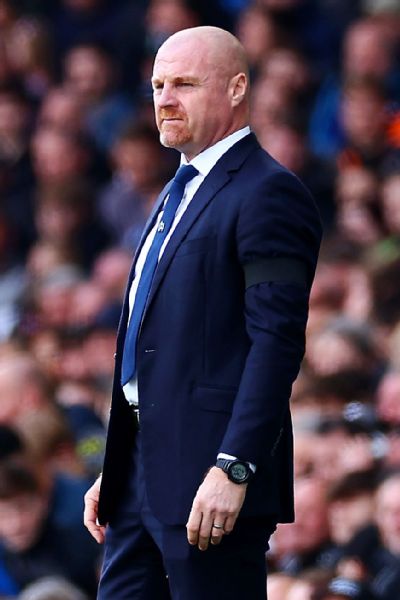
47. SEAN DYCHE, 53, Everton
Coaching acumen: 13/20
Style: 6/20
People management: 14/20
Communication: 15/20
History/achievements: 2/10
X factor: 3/10
Total: 53/100
Plenty has been written about Dyche's uncompromising and rather basic concept of football. The lack of finesse, the restricted freedom within his 4-4-2 system -- and his preference for graft over flair -- might have ruled him out of the top jobs, but he has earned respect for being loyal to his own ideas and executing them in an admirable manner.
Though the all-encompassing "manager" role of Arsene Wenger or Sir Alex Ferguson's era has become a thing of the past, Dyche's near 10-year stint at Burnley -- including an impressive seventh-place finish in the Premier League in 2017-18 -- saw him rebuild the club and apply his knowledge from the academy to the first team.
Dyche also deserves praise for keeping Everton in the Premier League for two consecutive seasons amid their financial turmoil and subsequent points deductions. The 53-year-old might be classed as a "safe pair of hands" rather than a modern visionary, as his sides sit deep and play a reactionary kind of football. But he does what he knows best without any apologies, and for that he's one of the best in the business.
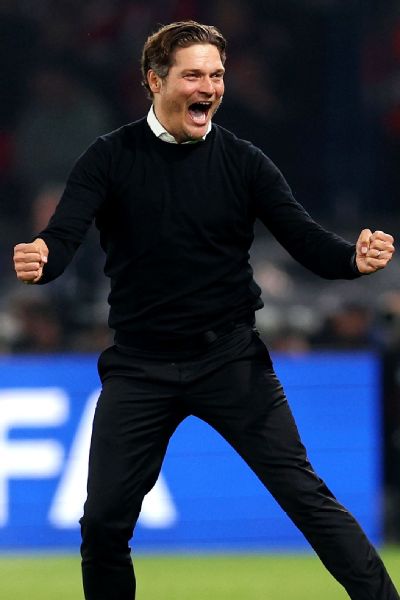
46. EDIN TERZIC, 41, Unattached
Coaching acumen: 8/20
Style: 12/20
People management: 11/20
Communication: 13/20
History/achievements: 2/10
X factor: 7/10
Total: 53/100
With a career as a scout, technical director and assistant coach (under Slaven Bilic at Besiktas and West Ham, for one) behind him, Terzic understands the sporting side of a club like few others. Yet, after getting a taste of management in an interim post at Borussia Dortmund in 2020 before taking the permanent job in 2022, he resigned following a surprise run to the Champions League final last season.
That UCL run camouflaged a disappointing domestic season as Dortmund finished in fifth despite having the second-highest budget in the Bundesliga, and it was partly due to a lack of a Plan B or pragmatism. But Terzic remains an interesting talent. He presents himself exceptionally well, is highly acclaimed for his work with younger players and had Dortmund playing some of the most exhilarating football in Europe (albeit when they still had star midfielder Jude Bellingham).
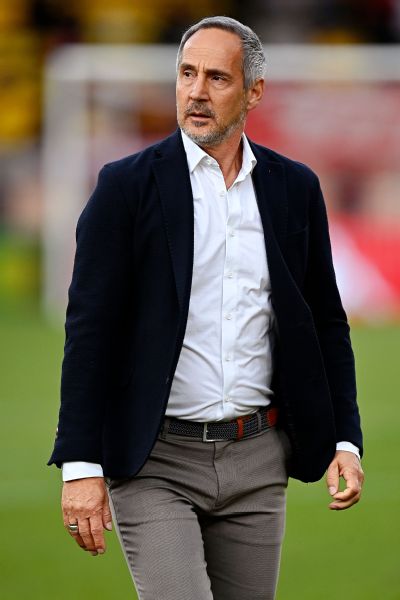
45. ADI HÜTTER, 54, AS Monaco
Coaching acumen: 12/20
Style: 12/20
People management: 13/20
Communication: 12/20
History/achievements: 3/10
X factor: 2/10
Total: 54/100
Beginning his coaching education in Austria, Hütter is another success story for FC Salzburg and won the domestic double in his single year in charge of the first team in 2014-15. Three years at Swiss side Young Boys culminated in the team winning their first league title in over 30 years in 2018, then he further impressed during short spells with Eintracht Frankfurt and Borussia Monchengladbach before joining Monaco in 2023.
Hütter wasted no time in introducing aggressive, intense football (illustrated by the team making 6.2 intensive challenges per 90 minutes, the highest in Ligue 1) to the young squad and brought the principality back into the Champions League by finishing second to Paris Saint-Germain. Though his brand of football doesn't always work with every team, there's little doubt that Monaco have so far proved to be a perfect fit for his methods.
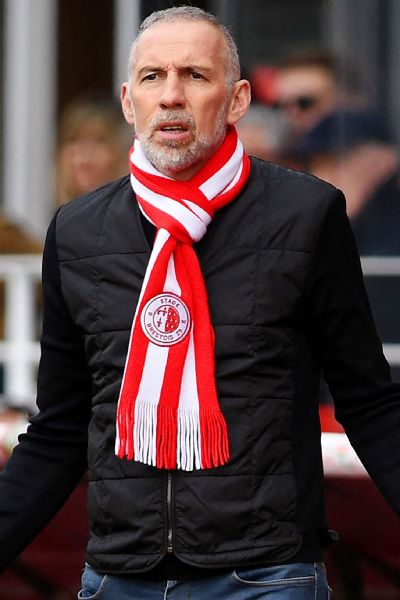
44. ERIC ROY, 56, Brest
Coaching acumen: 11/20
Style: 10/20
People management: 13/20
Communication: 14/20
History/achievements: 3/10
X factor: 3/10
Total: 54/100
The architect behind one of the unlikeliest feats of last season, Roy took French minnows Brest -- who have one of Ligue 1's lowest budgets -- from a relegation battle to their first Champions League campaign inside 18 months by finishing third. As a result, he won the French Professional Football Union's Coach of the Season award.
After a respectable playing career, Roy served as head of communications at Nice before landing his first coaching job at the club in 2010. In 2012 he was sacked (later winning a court case for wrongful dismissal) before taking a five-year hiatus from the game and returning as a sporting director at Lens and Watford.
He took over as coach of Brest in January 2023 and his recipe for success has been a well-balanced, industrious 4-3-3 formation with pragmatic principles. The team has proved defiant at defending set pieces and is mentally prepared to grind out narrow wins. Though Roy's 4-3-3 might appear an offensive formation in theory, strong discipline and high fitness levels mean that his wide forwards shift quickly back into a defensive shape once out of possession.
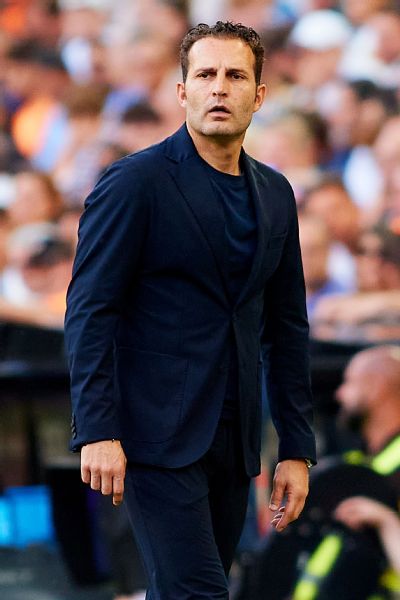
43. RUBEN BARAJA, 49, Valencia
Coaching acumen: 12/20
Style: 11/20
People management: 11/20
Communication: 12/20
History/achievements: 3/10
X factor: 5/10
Total: 54/100
Baraja hasn't enjoyed the easiest of rides in management. Taking charge of financially troubled LaLiga 2 sides such as Elche, Rayo Vallecano, Sporting Gijon, Tenerife and Real Zaragoza within a five-year span (2015-2020), he barely learned the names of the club staff before he was back on the road again.
So expectations were mild when he returned to cash-strapped Valencia -- where he won two league titles and reached the Champions League final as a player -- in February 2023 with the team deep in relegation trouble. But Baraja oversaw a great escape in a struggle that went all the way to the final day of the season. Then he somehow built on that effort to finish ninth last season with a team that had the lowest average age in LaLiga (24.5 years).
Mentored by Rafael Benitez, Baraja has a "safety first" approach, with his compact, deep-lying 4-4-2/4-2-3-1 formation hard for opponents to penetrate. Though there's little entertainment (Valencia had the second-fewest touches in the opposition box last season, with 477), he certainly knows how to get a team organised.
Herculez Gomez explains why he would pick Carlo Ancelotti over Pep Guardiola if he had to pick between the two managers.
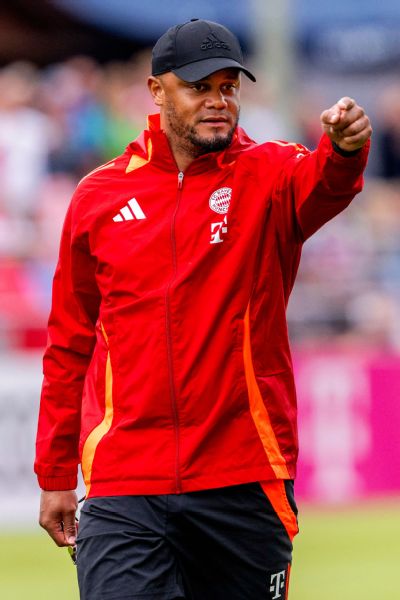
42. VINCENT KOMPANY, 38, Bayern Munich
Coaching acumen: 10/20
Style: 11/20
People management: 14/20
Communication: 12/20
History/achievements: 2/10
X factor: 6/10
Total: 55/100
Bayern Munich's appointment of the ex-Manchester City defender to replace Thomas Tuchel this summer came as a massive shock. Kompany retired as a player in 2020 and his short coaching career to date at Anderlecht and Burnley does not offer many clues as to how he might fare in one of the top positions in European football.
The fluid, dominating football that saw him gain promotion to the Premier League with Burnley in 2022-23 -- amid a serious squad rebuild -- helped him gain respect. But the subsequent season in the top flight, which ended in relegation after 24 defeats from 38 games, can be described only as a major disappointment.
With a superior squad and stronger winning mentality at Bayern, Kompany will no doubt find an environment more like the one he was used to during his playing days and his natural authority should help him assert his ideas. But it still seems like a serious gamble.
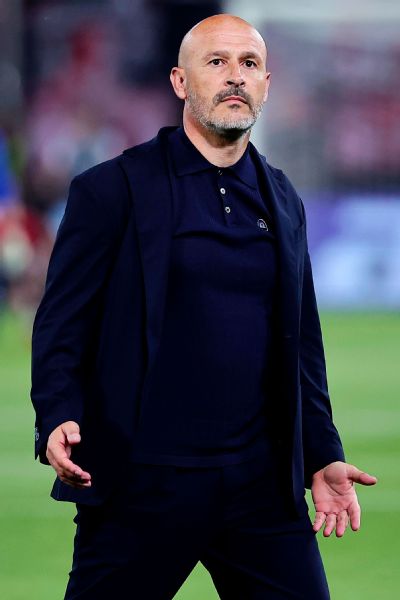
41. VINCENZO ITALIANO, 46, Bologna
Coaching acumen: 11/20
Style: 12/20
People management: 12/20
Communication: 11/20
History/achievements: 3/10
X factor: 6/10
Total: 55/100
Having spent some time learning his trade at lower levels since moving into coaching in 2014, Italiano helped Spezia into Serie A for the first time in their history in 2020. After leaving Fiorentina this summer, he faces a groundbreaking Champions League campaign with his appointment by Bologna.
Italiano might have left Fiorentina empty-handed as far as trophies are concerned -- with another defeat in the Europa Conference League final (his second on the bounce) -- but he left a mark on a club that had drifted into midtable mediocrity before his arrival in 2021. With its aggressive, high-pressing approach, the team was never dull to watch under the German-born coach. The proactive nature of Fiorentina's game -- always on the front foot, even away from home -- and high fitness levels proved that the 46-year-old got through to his players, whom he chopped and changed regularly to keep things fresh. Italiano's emotional and enthusiastic behaviour on the sidelines also proved a hit with the home fans.
Considered one of the most promising managers in Italy, his next challenge is to find the right balance between excessive pressing and a more patient approach.
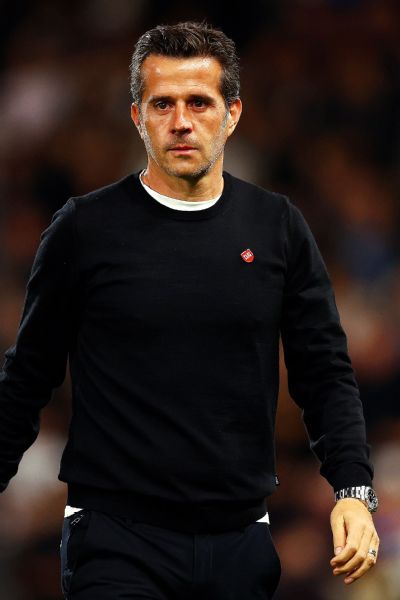
40. MARCO SILVA, 47, Fulham
Coaching acumen: 12/20
Style: 12/20
People management: 14/20
Communication: 11/20
History/achievements: 2/10
X factor: 5/10
Total: 56/100
Silva has been on the radar since he took unfancied Portuguese side Estoril into the Europa League in 2012-13. That achievement led to a subsequent move to giants Sporting CP -- where he lasted only one season -- and his tenures at Olympiacos, Hull, Watford and Everton were short before he settled at Fulham three years ago.
While such ups and downs are not unnatural, his stint at Fulham has shown him to be a mature, clear-minded manager. With a comparatively modest transfer budget, he has managed to build a functioning side and has had to mitigate key losses in a creative manner, such as shaping Rodrigo Muniz into a replacement for the influential Aleksandar Mitrovic.
As much as Silva favours his 4-2-3-1/4-3-3 formation to focus on attacking, he also adjusts his team's pressing according to the opposition and can plot a counterattack to devastating effect, as he did in the home wins vs. Arsenal and Spurs last season, as well as away at Man United.
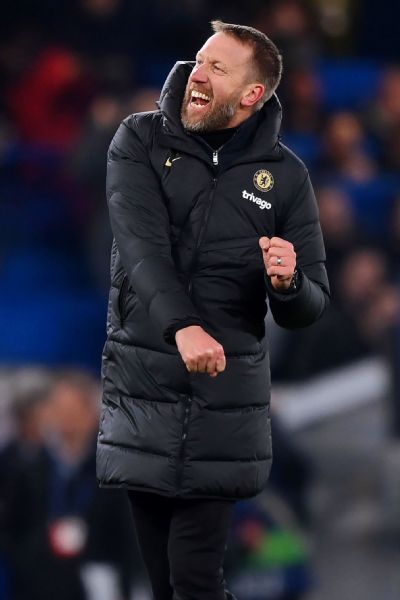
39. GRAHAM POTTER, 49, Unattached
Coaching acumen: 13/20
Style: 12/20
People management: 13/20
Communication: 10/20
History/achievements: 4/10
X factor: 4/10
Total: 56/100
Though best remembered for his miserable single season at Chelsea, Potter still deserves respect for building his career from the ground up, and for the miracles he performed at Östersund (taking them from the Swedish third tier to the 2017-18 Europa League) and Brighton (helping achieve what was then the club's highest finish, ninth, and points total in the top flight in 2021-22).
Potter is among the less dogmatic head coaches in circulation, he's not tied to a particular formation and he has successfully shuffled between three and four at the back, but his sides still have a clear identity. Indeed, his possession-based football is full of intricate details, often a product of hours of studying the opposition, making him a natural source of inspiration for up-and-coming coaches.
However, the fashion in which his Chelsea project collapsed in 2022-23 invites the question of whether he is capable of managing a big club.
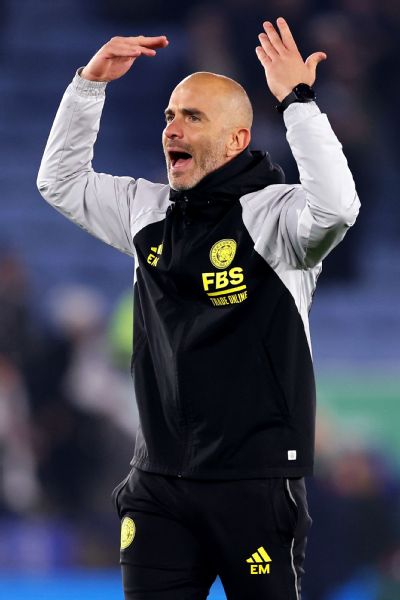
38. ENZO MARESCA, 44, Chelsea
Coaching acumen: 12/20
Style: 14/20
People management: 12/20
Communication: 10/20
History/achievements: 2/10
X factor: 7/10
Total: 57/100
The influence of Manchester City's Pep Guardiola on Maresca is clear. The Italian first worked under Guardiola in 2020 as a part of City's elite development squad staff, then returned after an unsuccessful season in charge of Serie B side Parma to take up an assistant role with the City first team in 2022 before leaving to lead Leicester during their Championship-winning campaign last season.
Much like his mentor, the soft-spoken, studious Maresca sees football like a chess board. He has the same kind of positional principles, with a flexible "false No. 9" striker used in the final third to open up space for midfielders or inverted wingers to attack; a meticulous, controlled buildup from the back (Leicester averaged 61% possession last season); and inverted full-backs to create an overload in midfield and increase resistance to counterattacks.
Yet, with just 1½ years' experience in the top job at first-team level, Maresca opted to become the sixth head coach (including caretakers) to take up the role at Chelsea under the current ownership. The Blues reportedly wanted a coach whose areas of influence were confined to the training ground and dugout, and he evidently fit the bill. How he manages to deal with the pressure for instant results is uncharted territory, but his calm, intelligent persona gives him a good chance.
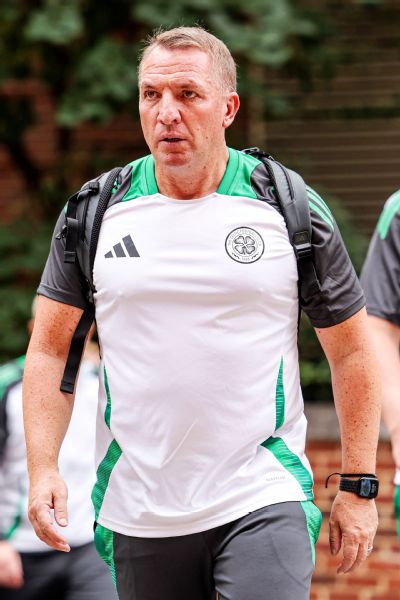
37. BRENDAN RODGERS, 51, Celtic
Coaching acumen: 12/20
Style: 12/20
People management: 12/20
Communication: 13/20
History/achievements: 4/10
X factor: 4/10
Total: 57/100
Since making his managerial debut at the tender age of 35 with Watford in 2008, the Northern Irishman has yet to enter a new season without a club. After high-profile spells in the Premier League -- impressing with newly promoted Swansea, guiding Liverpool to second place, and leading Leicester to the first FA Cup win in their history -- he still divides opinion like few others.
Perhaps, with all due respect, Rodgers should be managing somewhere other than Scotland as he reaches his peak years, given that he has managed nine trophies in two spells at Celtic. He has had other offers and continues to move with the times; his attacking 4-3-3 formation is appealing to watch, the passing game is fluid (67% possession last season) and his teams are well-drilled, neatly organised and generally hard to break down.
To his credit, he rarely needs months to mould a team into a functional unit. This, in turn, makes him a safe pair of hands to turn to for any club.
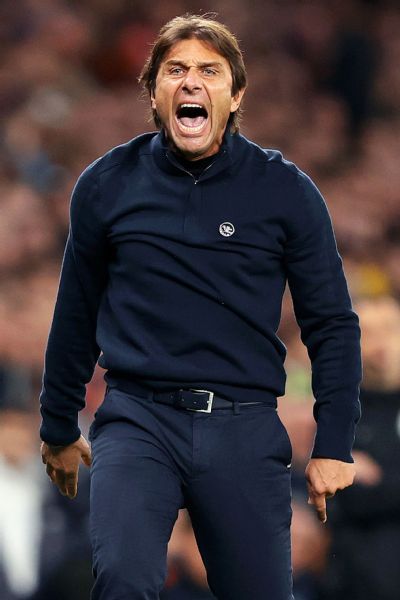
36. ANTONIO CONTE, 55, Napoli
Coaching acumen: 13/20
Style: 12/20
People management: 10/20
Communication: 10/20
History/achievements: 7/10
X factor: 5/10
Total: 57/100
While Conte rightfully deserves a place among the most influential and successful head coaches of the 2010s, he now has to rebuild his career at Napoli. As with many experienced managers, it's easy to undervalue Conte's career based on his most recent job, as his tenure at Spurs petered out in controversies and general disappointment. But remember, he led Inter Milan to a magnificent Serie A title just three years ago.
The question, however, is whether the Conte of today is capable of reproducing the intense and direct sides of the past, who always play on the front foot. As much as the former Juventus, Italy and Chelsea boss -- who has eight major domestic titles to his name, including one from the Premier League and four from Serie A -- is a knowledgeable coach, his insistence on a tough playing style doesn't allow for much pragmatism or flexibility.
Conte's average points tally of 2.15 per game across Serie A and the Premier League is stunning, but the mental, physical and tactical demands on his players in his 3-5-2 system are a lot. His centre-backs need to be adept in a back three, while high-energy wing-backs are vital to making it work. That means he is not really suited to taking over teams in midseason, or without a major squad rebuild, which has led to recurring disagreements with clubs when they haven't given him money to spend.
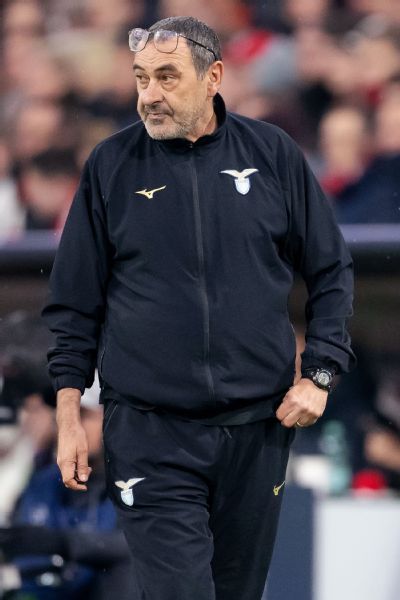
35. MAURIZIO SARRI, 65, Unattached
Coaching acumen: 14/20
Style: 14/20
People management: 12/20
Communication: 9/20
History/achievements: 5/10
X factor: 4/10
Total: 58/100
Sarri is a fascinating character. A late bloomer to top-level coaching, the chain-smoking Italian was well into his 50s when his tireless, methodical work finally brought him to Serie A with Empoli. Even so, he can rightfully claim his place among the generation of managers who brought a fluent, movement-based, attacking style to Italy.
Though a single Serie A title with Juventus (2019-20) and a Europa League trophy with Chelsea (2018-19) might end up as the only major honours in his career, he engineered one of the most aesthetically pleasing sides in Europe when in charge of Napoli from 2015 to 2018 and can claim partial credit for their eventual ascent.
His use of a deep-lying playmaker (such as Jorginho) is a key part of his 4-3-3 approach. And though his recent stint at Lazio stint petered out into nothing (they finished seventh last season after being runners-up in 2022-23), his habit of paying zero attention to PR, media or gamesmanship makes him a rather novel -- albeit slightly grumpy, some would say -- individual in the modern game.
Don Hutchison and Frank Leboeuf discuss Manchester United's decision to keep Erik ten Hag.
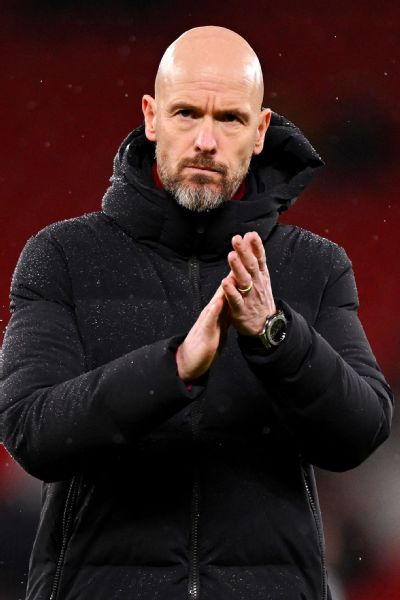
34. ERIK TEN HAG, 54, Manchester United
Coaching acumen: 14/20
Style: 12/20
People management: 12/20
Communication: 7/20
History/achievements: 7/10
X factor: 6/10
Total: 58/100
Ten Hag once coached Bayern's second team, but he made his name in the Eredivisie, first with FC Utrecht and then with Ajax from 2017 to 2022. Winning three titles at Ajax with a free-flowing, possession-oriented unit founded on firm defensive principles, he impressed enough to land the Manchester United job. Yet his two years at Old Trafford have made for one of the most confusing Premier League tenures in modern times.
While he has delivered two trophies (the FA Cup and EFL Cup), he also has led the club to its lowest-ever Premier League finish (eighth) with a team that often looked lost and disjointed. Off the pitch, Ten Hag has struggled to balance out his authoritarian approach, and his man-management skills have come under the microscope amid high-profile clashes with Cristiano Ronaldo and Jadon Sancho.
In his defence, Ten Hag took over a club lacking in performance culture, with a squad built somewhat haphazardly. To the surprise of many, he was recently handed a one-year contract extension and now, with the support of a more-qualified backroom staff, he will get another chance to prove that he's cut out for one of the biggest jobs in the world.
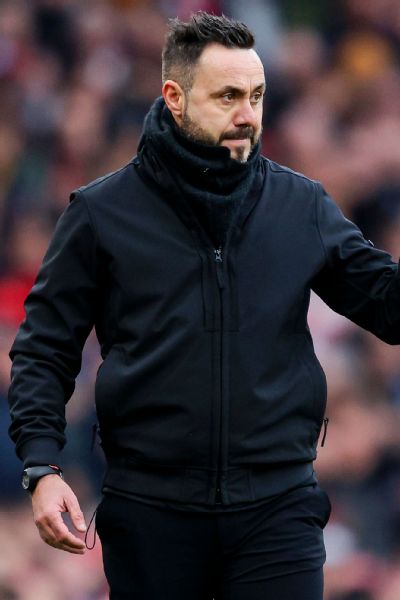
33. ROBERTO DE ZERBI, 45, Marseille
Coaching acumen: 15/20
Style: 15/20
People management: 11/20
Communication: 10/20
History/achievements: 2/10
X factor: 6/10
Total: 59/100
De Zerbi cut his high-energy, aggressive brand of football with Benevento, Sassuolo and Shakhtar Donetsk. His reputation as a progressive, inventive coach was further cemented during his first season at Brighton in 2022-23, in which he manufactured a spectacular possession-based style to finish seventh and secure European football for the first time in the club's history.
Though Brighton somewhat unravelled under the pressure of playing European football during his second season, finishing 11th, De Zerbi proved a capacity to take meticulous, detail-oriented work on the training ground into a match setting -- perhaps the hardest skill for a coach. His modern, aggressive approach unsurprisingly helped boost the Italian's stock, and he was in contention for some of the top jobs in Europe this summer, before opting to head to Marseille for the chance to manage in a different country.
There is an uncertainty over De Zerbi's man-management skills, how prepared he is to align with a club's hierarchy behind the scenes, his somewhat shy media presence, plus some unanswered questions as to why Brighton fell away during his second season. However, time is on his side, and by learning from his past mistakes he will surely be in contention for more top jobs in the future.
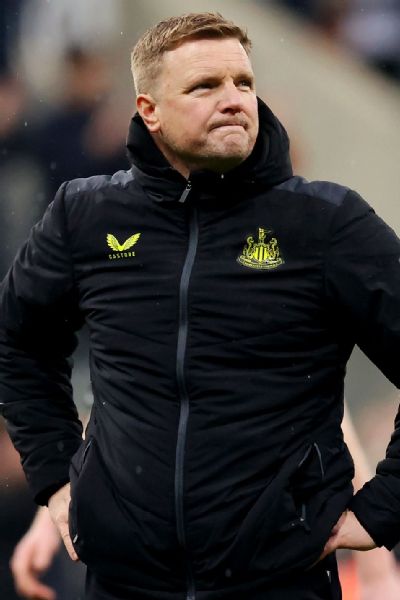
32. EDDIE HOWE, 46, Newcastle United
Coaching acumen: 12/20
Style: 12/20
People management: 15/20
Communication: 13/20
History/achievements: 3/10
X factor: 4/10
Total: 59/100
At the age of 31, Howe became the youngest manager in the Football League when he began his senior coaching career at Bournemouth in 2009, and his 11 years across two spells on the south coast -- with a single season at Burnley in 2011-12 in between -- moulded his ethos of considered, focused communication and a hands-on approach in training.
Tipped as a future England manager, Howe is a sensible, hardworking professional who is used to carrying out his work in a high-pressure, emotional environment. Though usually at the bottom end of the table. His work ethic is impressive, and he told Graham Hunter's "Big Interview" podcast in 2016 that reading one of the books written by former UCLA college basketball coach John Wooden "transformed my ideas on coaching, management, and life."
His 2½ years at Newcastle have so far seen the club's project under the ownership of Saudi Arabia's Public Investment Fund evolve slowly but surely. Although some might have expected to see a more expansive Newcastle side by now, youngsters such as Anthony Gordon, Alexander Isak and Lewis Miley have blossomed, and the club have shown glimpses of what they can achieve. Indeed, Howe has repeatedly bounced back from periods of adverse form, showing his resilience.
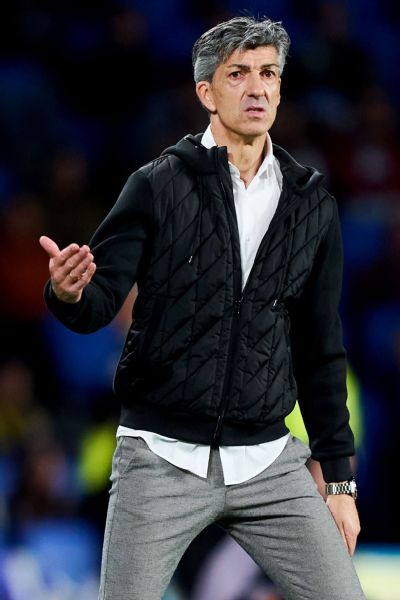
31. IMANOL ALGUACIL, 53, Real Sociedad
Coaching acumen: 13/20
Style: 13/20
People management: 14/20
Communication: 11/20
History/achievements: 3/10
X factor: 5/10
Total: 59/100
Imanol's journey to becoming Real Sociedad head coach is almost unheard of in modern times. As a player, he came through the club's academy and returned to coach the youth team in 2011. Since then, he has worked his way through the ranks and has been in the top job since 2018, bringing stability (five consecutive top-six finishes in LaLiga) and forming a beautifully well-balanced side.
Over the past two seasons La Real have the third-best defensive record in LaLiga, yet Imanol's side are also attractive to watch. Though an attacking 4-3-3 formation is close to his heart, Imanol is flexible. With a strong spine that blends physicality and industry, the team only tend to take risks in wide areas, courtesy of attacking full-backs and brilliant one-vs.-one wingers such as Mikel Oyarzabal and Takefusa Kubo. The buildups tend to be unhurried (56.3% average possession last season), before they explode into quick combinational exchanges in the final third.
While Imanol might be one of the more understated, unobtrusive coaches in LaLiga, he has established himself as one of the most reliable.
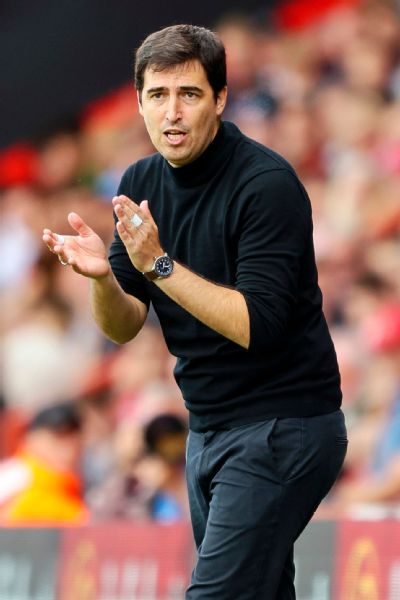
30. ANDONI IRAOLA, 42, Bournemouth
Coaching acumen: 12/20
Style: 12/20
People management: 15/20
Communication: 12/20
History/achievements: 2/10
X factor: 7/10
Total: 60/100
When Iraola replaced Gary O'Neil at Bournemouth ahead of last season, the club cited "playing style" as one of the reasons for the change. The Basque manager, who started his coaching career in Cyprus with AEK Larnaca in 2018, had promised the board he could deliver a more attractive style. And, on the evidence of his first Premier League season, his pledge holds up.
Iraola's intense pressing style -- a highly coordinated manoeuvre in which the final execution is never better than its weakest link -- takes time to leave a proper imprint and was in full flow after three years at Rayo Vallecano. But Bournemouth are quick learners and the team's PPDA (passes allowed per defensive action -- a metric that shows how many passes the opposition is allowed before losing possession) -- of 9.48 was outdone only by Arsenal, Spurs and Liverpool.
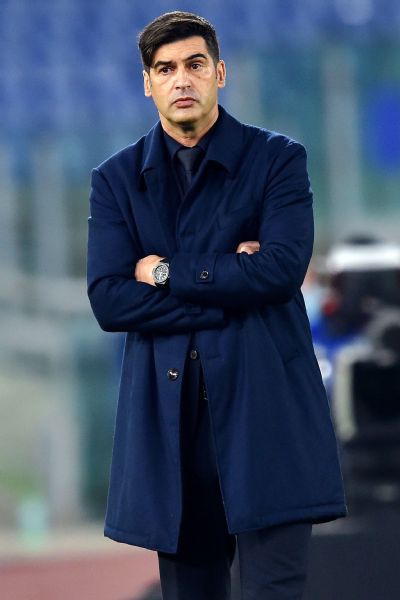
29. PAULO FONSECA, 51, AC Milan
Coaching acumen: 13/20
Style: 13/20
People management: 13/20
Communication: 12/20
History/achievements: 3/10
X factor: 6/10
Total: 60/100
Having made his name at modest Portuguese clubs like Desportivo Aves and Paços de Ferreira, Fonseca got his first taste of a big club with FC Porto in 2013. Though that experience lasted only nine months, he persistently ground his way up the coaching ladder in start/stop fashion -- by way of Paços de Ferreira (again), Braga, Shakhtar Donetsk, AS Roma and Lille -- before landing in Milan this summer.
He took Lille to fifth place in Ligue 1 in his first year, before finishing fourth last season with a net profit of €80m from the transfer market, which is impressive. Deploying a high defensive line in his preferred 4-2-3-1 formation, Fonseca saw Lille base their attack on possession (with 56.4% possession per game) yet at the same time allow the fewest shots against them (8.19).
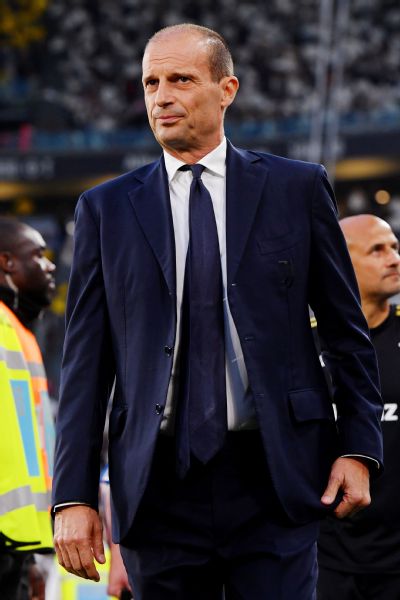
28. MASSIMILIANO ALLEGRI, 56, Unattached
Coaching acumen: 15/20
Style: 11/20
People management: 13/20
Communication: 11/20
History/achievements: 6/10
X factor: 4/10
Total: 60/100
One of the most successful Italian managers of the past decade -- with five league titles in a row at Juventus between 2014 and 2019 and one at AC Milan in 2011 -- Allegri was previously recognised as an exponent of attacking, imaginative football but has become more cautious as the years have passed.
When he left his first spell in Turin in 2019, he had the highest win percentage (70.48%) in the club's history. But recently, rather than enthusing the Juve fans, Allegri's sides tended to grind out narrow wins, excel at set pieces and defend deeper with organisation and discipline.
Still, when asked how Man City boss Pep Guardiola differs from Allegri in style, Danilo (a player who has played for them both) told Forbes: "As far as managing the team off the pitch, Allegri is undoubtedly the smartest."
The 56-year-old does have a temper, though. His second spell at Juventus ended in controversial circumstances in May as he was dismissed less than 48 hours after beating Atalanta in the Coppa Italia final, having thrown his jacket and tie to the ground on the sidelines and aggressively squared up to the fourth official as he was sent off in injury time.
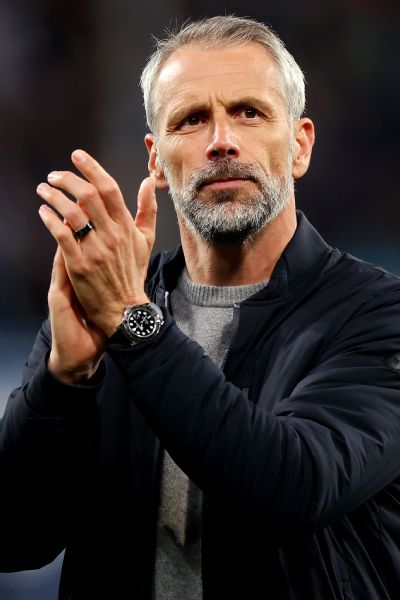
27. MARCO ROSE, 47, RB Leipzig
Coaching acumen: 12/20
Style: 12/20
People management: 14/20
Communication: 14/20
History/achievements: 2/10
X factor: 7/10
Total: 61/100
Rose is one of the many students of current Austria boss Ralf Rangnick and the Gegenpressing (putting pressure on opponents across the pitch) style. He came to prominence for his work at FC Salzburg between 2013 and 2019, where he started as under-16 boss and rose to become first-team manager within five years.
Known for his high-energy, aggressive brand of football, his work at Salzburg and then Borussia Monchengladbach saw him handed the reins at Borussia Dortmund for the 2021-22 season. But he lasted just one season, despite finishing second amid perpetual injury woes. Rangnick helped Rose back into work at RB Leipzig and his impact has been positive as he took the club to a DFB Pokal win and two top-four finishes.
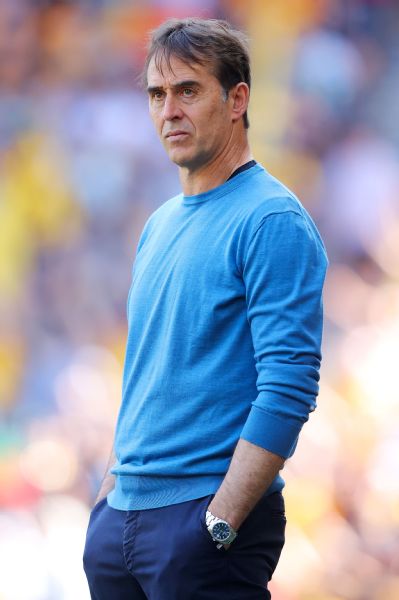
26. JULEN LOPETEGUI, 57, West Ham United
Coaching acumen: 14/20
Style: 13/20
People management: 14/20
Communication: 11/20
History/achievements: 4/10
X factor: 5/10
Total: 61/100
Lopetegui carries significant pedigree from his time in charge of Spain -- managing three youth teams from 2010 to 2014, before taking over the senior team in 2016 -- but he was famously sacked on the eve of the 2018 World Cup in Russia when it emerged that he'd agreed to join Real Madrid. Ironically, that stint in Madrid lasted just a few months due to poor form, but he rebuilt his career at Sevilla and during a six-month cameo at Wolves in 2022-23.
Lopetegui's core coaching principles mean he is an advocate of a fluid, Barcelona-esque 4-3-3 system, but he showed his adaptability at Wolves when having to resort to more basic means to get the club on safe ground. This summer, West Ham turned to the experienced Spaniard as they look to adapt a more expansive approach following five years of David Moyes -- they had the fourth-lowest possession rate in the Premier League (41%) last season.
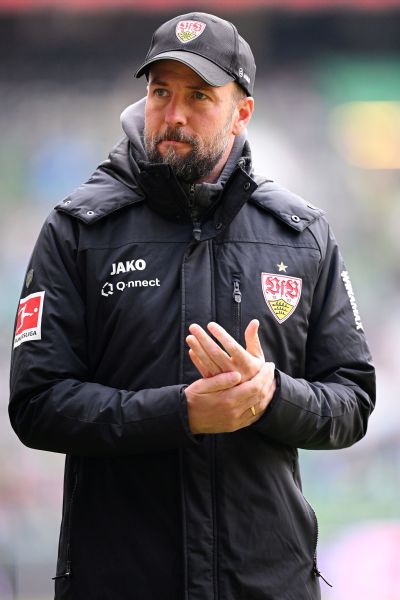
25. SEBASTIAN HOENESS, 42, Stuttgart
Coaching acumen: 12/20
Style: 14/20
People management: 14/20
Communication: 13/20
History/achievements: 2/10
X factor: 7/10
Total: 62/100
The son of Dieter Hoeness (ex-Germany centre-forward and former director at Hertha Berlin and Wolfsburg) and nephew of Uli (Germany legend and holder of myriad executive roles at Bayern Munich) certainly has football in his DNA. Hoeness worked his way up via the youth teams of RB Leipzig and Bayern before landing his first job at TSG Hoffenheim in 2020. And although he has been at the helm of Stuttgart only since April 2023, his story is already one of folklore.
Not only did Hoeness steer his boyhood club clear of relegation with the odds stacked against him -- playing the high-pressing, dynamic football that has formed so many modern German and Austrian coaches -- he took them to second place (one point ahead of Bayern) in his first full season. And he did so with style too, as Stuttgart scored the league's third-highest number of goals (78). But the coming season could be a challenge with top stars set to depart.
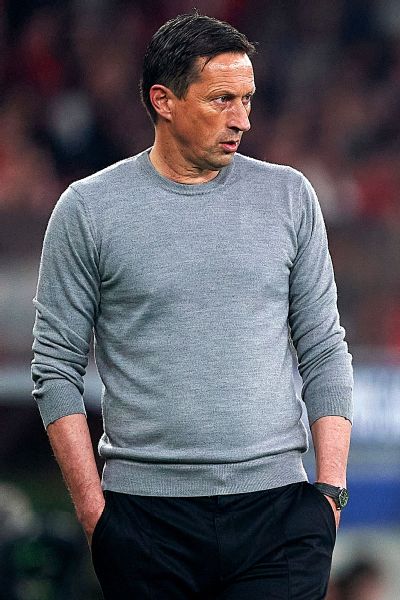
24. ROGER SCHMIDT, 57, Benfica
Coaching acumen: 14/20
Style: 14/20
People management: 14/20
Communication: 12/20
History/achievements: 3/10
X factor: 5/10
Total: 62/100
After winning an Austrian league title with FC Salzburg in his first high-profile job in 2014, Schmidt failed to assert his high-pressing, vigorous style during a three-year stint at Bayer Leverkusen and took a career detour to Beijing Guoan in China, before he led PSV Eindhoven to a runner-up spot in the Eredivisie for two seasons running.
But it was a move to Portugal where his proactive style really took off and, so far, his spell at Benfica has been nothing but positive. Indeed, Schmidt won the title in his first season and enjoyed a Champions League run that culminated in a quarterfinal defeat to Inter Milan in 2022-23.
Despite predominantly facing low blocks, under Schmidt, Benfica have become proficient at regaining the ball (aided by high fitness and a strong mentality) and surely would have narrowed the 10-point gap to Sporting last season if they had signed a quality centre-forward.
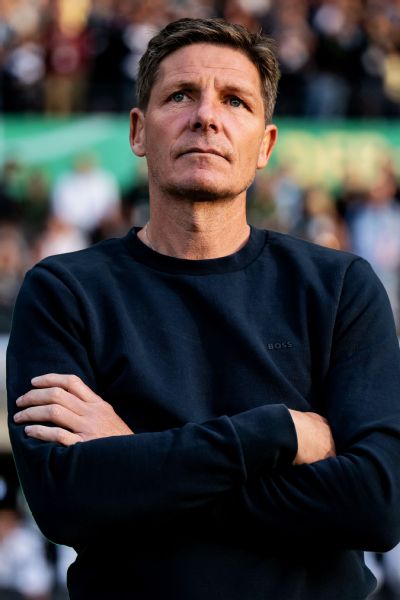
23. OLIVER GLASNER, 49, Crystal Palace
Coaching acumen: 14/20
Style: 14/20
People management: 14/20
Communication: 13/20
History/achievements: 3/10
X factor: 5/10
Total: 63/100
Glasner built his reputation in Austria with LASK (with a solid 1.97 average points per game over 166 games), and oversaw fine stints at Wolfsburg and Eintracht Frankfurt, with whom he won the Europa League in 2022. Yet another from the Ralf Rangnick school of coaching, having started his career as an assistant at FC Salzburg, Glasner generally favours a back three -- which sets him slightly apart from the other Rangnick protégés -- with wing-backs pushing deep into attacking areas. The deployment of two "No. 10" midfielders with licence to advance into the box is another element to his attacking schemes.
Palace convinced the Austrian to lead the post-Roy Hodgson "reset" in February 2024 and the transformation was immediate. He took Palace to seven wins out of 13, scoring an average of 2.2 goals per game, and masterminded some memorable home victories (4-0 vs. Manchester United; 5-0 vs. Aston Villa) in the process. The number of pressures on the ball increased by 18% after Glasner took charge, which illustrates how he likes to play on the front foot.
Tottenham boss Ange Postecoglou says his team have made decent progress after a "tough year" the season before.
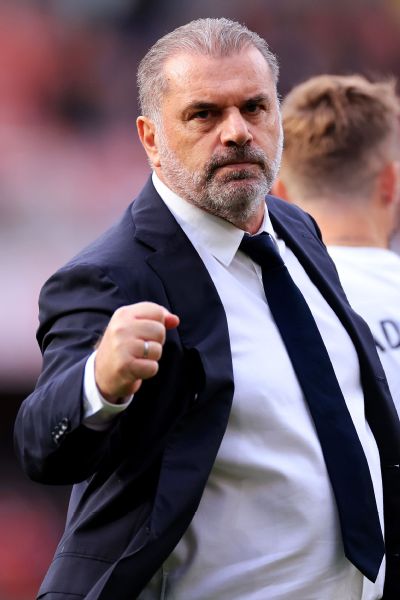
22. ANGE POSTECOGLOU, 58, Tottenham
Coaching acumen: 12/20
Style: 13/20
People management: 15/20
Communication: 14/20
History/achievements: 3/10
X factor: 6/10
Total: 63/100
The appointment of the relatively unknown Postecoglou, whose experience was limited to managing in Greece, Australia (domestically and with the national team), Japan and Scotland (where he won five of the six domestic trophies available with Celtic), was as bold as it was unexpected. However, one year on, it is fair to say the move has paid off. Amid the turbulence of Antonio Conte's and Jose Mourinho's tenures, the resignation of sporting director Fabio Paratici, and losing world-class striker Harry Kane to Bayern Munich, the Australian instantly brought stability and hope to Tottenham.
While Postecoglou may have his limitations from a tactical viewpoint, "Angeball" has arrived in the Premier League with a high defensive line, narrow full-backs and commitment to attacking intent no matter the opponents. His teams look to regain the ball and transition quickly, rather than spend lengthy spells of possession high up the pitch, and it has been highly entertaining: see the 3-3 draw with Manchester City, or 4-1 defeat to Chelsea when the entire Spurs team defended from the halfway line despite being down to nine men.
Postecoglou himself is refreshingly honest, informal and unpretentious when it comes to the media. "There's only two states of being as a manager -- you're either under siege, or it's coming," he said last November. What remains uncertain is whether the 58-year-old is capable of building on his positive debut season, as history has shown that the club's hierarchy don't take sideways steps lightly.
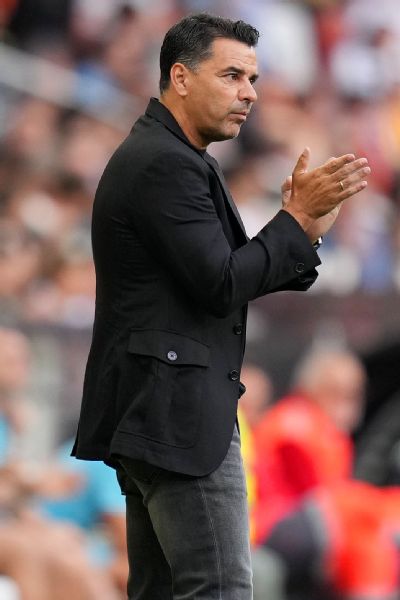
21. MICHEL, 48, Girona
Coaching acumen: 14/20
Style: 14/20
People management: 14/20
Communication: 13/20
History/achievements: 3/10
X factor: 6/10
Total: 64/100
A relative newcomer to topflight coaching, Michel had only brief spells at Huesca and Rayo Vallecano (getting both promoted) before taking charge at Girona three years ago. But those three seasons have been a meteoric success. Having taken the club (which is owned by the City Football Group) up to LaLiga at the first try in 2021-22, Michel then oversaw a 10th-place finish before mounting an unlikely title challenge to eventually finish third last season and seal a spot in the Champions League.
The 48-year-old has built an organised side -- predominantly rotating attacking 4-2-3-1 / 3-4-3 systems -- where keeping hold of the ball (they ranked fourth in LaLiga for possession with 57.1%), shifting the opposition from side to side, and explosive wing-play are essential components. He also looks for goals from midfield, generally allowing his central players to make runs to support the attack.
Much like Guardiola on the sidelines, Michel lives every kick of the game. Turning the likes of Artem Dovbyk, Sávio, Aleix García and Miguel Gutiérrez into stars speaks volumes of his motivational abilities and the clarity of his system.
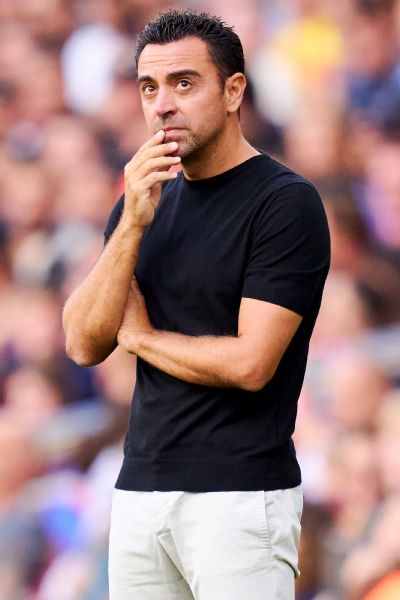
20. XAVI HERNANDEZ, 44, Unattached
Coaching acumen: 12/20
Style: 15/20
People management: 14/20
Communication: 12/20
History/achievements: 4/10
X factor: 7/10
Total: 64/100
A legendary midfielder for Barcelona, Xavi came through the ranks of the academy and played over 500 times for the club, winning everything possible before leaving for Al Sadd in 2015. Shortly after hanging up his boots in 2019, he took his first step in management at the Qatari club, leading them to seven trophies in two years, but one always imagined him in the Camp Nou hot seat.
In 2021, the prodigal son returned, and while he can claim a main role in the development of the likes of Lamine Yamal, Pau Cubarsí, Fermín López and Alejandro Balde, his tenure was fraught with issues. One trophy (LaLiga) in three years is a meagre windfall for a club like Barcelona, and though it came at a time of huge financial challenges, upon announcing he would be stepping down in January 2024 he hit out at a "cruel and unpleasant job" that "makes you feel worthless on a daily basis."
Tactically, Barcelona -- with a deeply ingrained 4-3-3, possession-based, attack-minded style inspired by the great Johan Cruyff -- fly on autopilot to a certain extent, but Xavi's presence was a stabilising one amid all the off-pitch turmoil and he won praise for his discipline, ruthlessness and management of a star-studded dressing room that contained many of the same players he played with during his career.
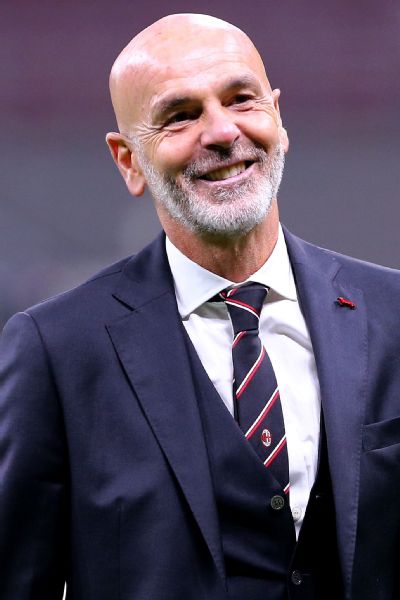
19. STEFANO PIOLI, 58, Unattached
Coaching acumen: 14/20
Style: 13/20
People management: 14/20
Communication: 12/20
History/achievements: 6/10
X factor: 5/10
Total: 64/100
With 16 different jobs on his CV since 1999, the experienced coach left AC Milan at the end of last season after (nearly) five eventful seasons in charge. Before ending up at Milan, Pioli had long been considered one of the most promising coaches in Italy, without quite being able to mount a proper title challenge at either Lazio or Inter Milan.
Pioli's work at Milan, however, will go down in history. Not only did he take the club back into the Champions League after an eight-year absence, but he also led them to their first Serie A title in 11 years. And, when it came, his departure carried more of the hallmarks of a management stint that had run its course than a lack of confidence in his abilities.
A practical coach, Pioli wants his teams to play on the front foot, often opting to find the penetrative space in behind rather than lengthy periods of circulating the ball. Typically lining up with three central midfielders (4-3-3/4-2-3-1), flying full-backs and a centre-forward to play the ball in to, one thing that was key to his success with Milan was allowing winger Rafael Leão to exploit space on the left flank.
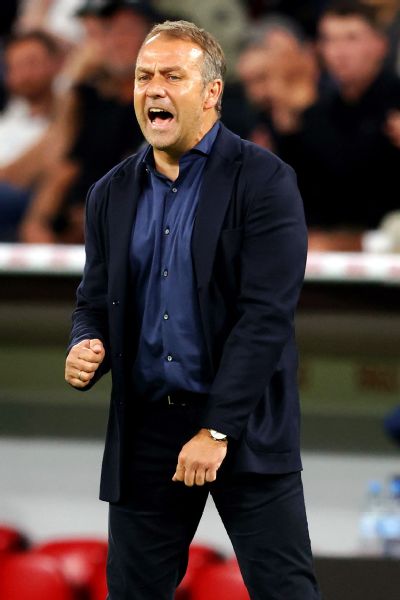
18. HANSI FLICK, 59, Barcelona
Coaching acumen: 14/20
Style: 14/20
People management: 15/20
Communication: 12/20
History/achievements: 6/10
X factor: 4/10
Total: 65/100
Barcelona's decision to replace Xavi with Flick this summer was greeted with surprise. While the experienced German's intrinsic philosophy -- high possession and ball circulation, paired with pressing off the ball and ample freedom for attacking players to interchange positions -- is similar to the Barcelona modus operandi, the 59-year-old doesn't have much experience in club football.
Indeed, Flick built his reputation over a 12-year spell as assistant to Joachim Löw on Germany's national team. As a result, he was handed a chance to take over at Bayern (in a role that started on a caretaker basis) and won seven trophies in two years, including the Champions League in 2019-20, before he jumped at the chance to take full control of Germany in 2021 -- though he became the first person to be sacked from the role after picking up the country's second-worst points rate (1.72 points per game).
Flick is a first-class communicator and a genuine people person. He has managed to win the respect of high-profile players throughout his career and invites a close dialogue with them to create consensus around tactical ideas and how objectives can be achieved.
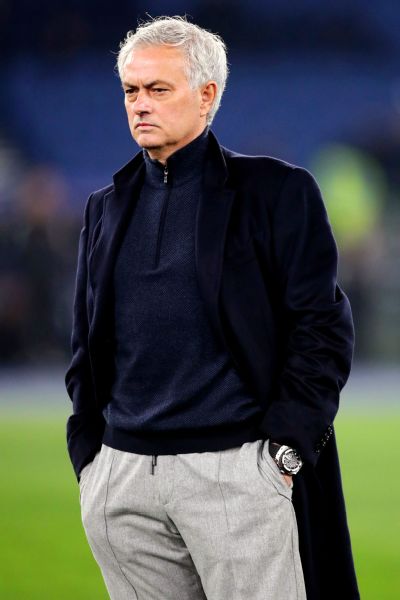
17. JOSE MOURINHO, 61, Fenerbahçe
Coaching acumen: 16/20
Style: 7/20
People management: 11/20
Communication: 18/20
History/achievements: 9/10
X factor: 4/10
Total: 65/100
Amid a 31-year career that has seen him take charge of almost every top club in Europe -- including FC Porto, Chelsea, Inter Milan, Real Madrid, Man United, Tottenham and Roma -- and winning 37 trophies in the process, the Portuguese remains one of the legends of the game.
Mourinho's first spell in charge of Chelsea between 2004 and 2007 brought great success but also a style that saw the phrase "park the bus" enter into football lexicon, as it required great defensive discipline and 10 men behind the ball. While he has been generally adored by his star players during his career, that relationship seems to have become more strained in recent times and has been the cause of many an exit with dressing-room tensions heightened.
"The Special One" is still box office viewing, mainly for the news conferences where he speaks his mind openly, often creating drama with rival bosses, and touchline antics -- such as sprinting half the length of the pitch to celebrate at Old Trafford for Porto, or smuggling himself into a UCL game he was banned for inside a laundry basket. Over time, his rock-star credentials have hardly diminished.
Despite varying results, he still managed to win over the supporters during a 2½-year spell in his previous job at Roma. In true Mourinho fashion, he also stirred up the energy and belief to lead the club through some memorable European nights (winning the Europa Conference League in the process). Now somewhat out of the spotlight at Fenerbahçe after turning down a lucrative offer from Saudi Arabia, he will still make headlines wherever he goes.
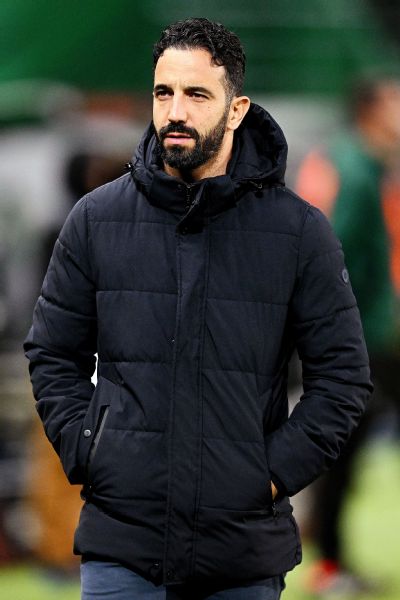
16. RUBEN AMORIM, 39, Sporting CP
Coaching acumen: 13/20
Style: 15/20
People management: 14/20
Communication: 14/20
History/achievements: 3/10
X factor: 7/10
Total: 66/100
Still in the infancy of his coaching career, after single-season spells with Casa Pia and Braga, the former Portugal midfielder has made a case to be considered one of most promising up-and-coming head coaches in European football.
As a player, Amorim was seen as a studious, methodical football thinker and has lived up to that reputation since joining Sporting in 2020. Under his leadership, the club won their first league title in 17 years (2020-21) and repeated the feat last season. Usually favouring a defensive back three with attack-minded wing-backs, Amorim's side are attractive to watch. Building from the back and interchanging positions -- with even centre-backs joining the build-up -- they are incredibly flexible and are one of the most aggressive sides in Portugal without the ball.
Despite reports of interest from Chelsea, Liverpool and Manchester United -- plus a rather embarrassing public flirtation with West Ham -- Amorim is about to embark on his fifth full season with Sporting. While his desire to move abroad failed to materialise this summer, his development will continue to be closely monitored by elite European clubs.
Arne Slot speaks about filling the "big shoes" left behind by Jurgen Klopp and what he hopes for Liverpool next season.
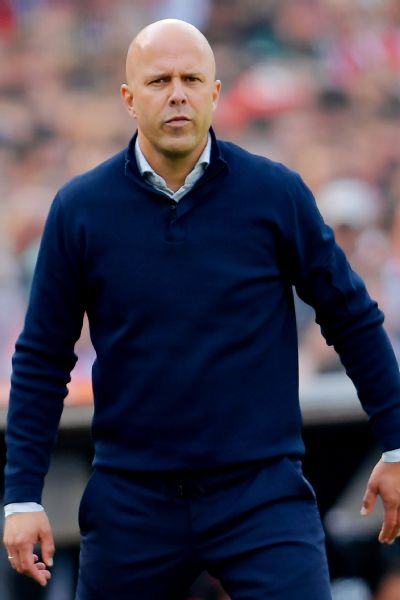
15. ARNE SLOT, 45, Liverpool
Coaching acumen: 14/20
Style: 14/20
People management: 13/20
Communication: 14/20
History/achievements: 3/10
X factor: 8/10
Total: 66/100
Slot arrives at Liverpool with an outstanding recent record in Dutch football. After single-season spells at Cambuur and AZ, he took Feyenoord to the Europa Conference League final in his first campaign in 2021 and then won the club's first league title in 30 years the following season. Crucially, he did so with a playing style that doesn't differ too much from Jürgen Klopp's at Liverpool -- with an aggressive high press and defiant counter-press, as well as using an inverted right-back and wingers who excel in one-vs.-one battles.
Slot's career path may be short, but he has already shown an ability to bring through young players, and the clubs he has coached so far have significantly improved under his leadership.
The hardest factors to predict when appointing a foreign manager are whether the soft skills of management -- communication to get the message across, cultural adaptation -- can also travel across borders. But Slot seems to have what it takes and certainly does not lack self-belief. His relatively young age also suggests that he will learn quickly and adapt to his new surroundings.
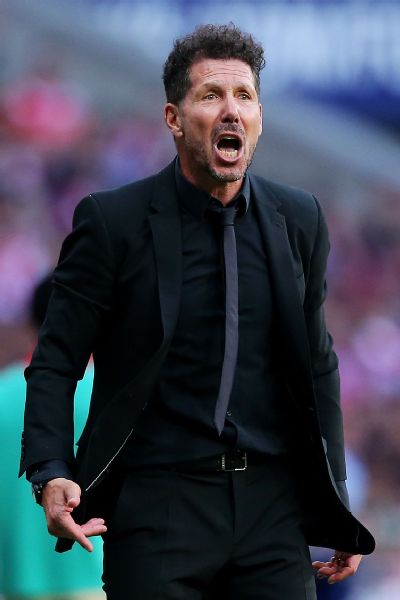
14. DIEGO SIMEONE, 54, Atlético Madrid
Coaching acumen: 16/20
Style: 11/20
People management: 14/20
Communication: 12/20
History/achievements: 7/10
X factor: 7/10
Total: 67/100
Cutting his managerial teeth in his homeland of Argentina, Simeone now has nearly 700 games in charge at Atlético Madrid since taking charge in 2011, with two LaLiga titles and two Champions League finals under his belt -- an incredible achievement given he was up against the Lionel Messi/Cristiano Ronaldo era at Barcelona and Real Madrid.
Simone's defensive and combative style might not be to the taste of the aesthetically inclined, but his tactical nous, adaptability and the winning mentality he instils in his players make him one of the trickiest opponents to face -- especially in a knockout competition.
Reported to be the highest-paid club coach in Europe, his neatly built empire is anchored on strict organisation, rigorous discipline and relentless effort. However, last season saw the club drop out of the top three and murmurs of discontent were heard during the campaign for the first time in 13 years.
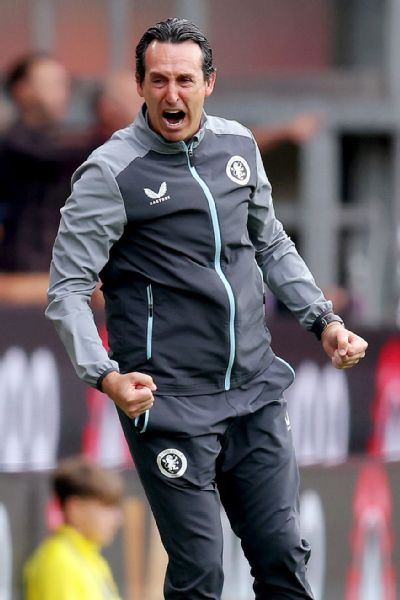
13. UNAI EMERY, 52, Aston Villa
Coaching acumen: 14/20
Style: 14/20
People management: 15/20
Communication: 13/20
History/achievements: 6/10
X factor: 6/10
Total: 68/100
By guiding Aston Villa to fourth place and securing a Champions League spot, the Basque tactician finally obtained his due respect in the Premier League last season. The critics were loud when he first arrived in Birmingham after struggling in his impossible task to replace Arsene Wenger at Arsenal, but 20 months later he has shown a knack for instilling a clear footballing philosophy: an intense, high-pressing unit based on quick regaining of the ball and explosive transitions. Against stronger opposition, however, Emery is pragmatic enough to set up his side in a mid-block.
Having won Europa League titles with Sevilla (a historic three in a row) and Villarreal, as well as a league title with PSG, Emery has proved capable of success with modest as well as affluent budgets. Obsessed with details, Emery clearly understands that a well-functioning side doesn't just appear out of the blue. He's extremely meticulous in positioning, habitually reconstructing in-game situations on the training ground -- to a higher extent than what would be considered normal -- to make sure his message is understood. To some, Emery's style might appear too demanding and repetitious, but many of his players end up much improved as a result.
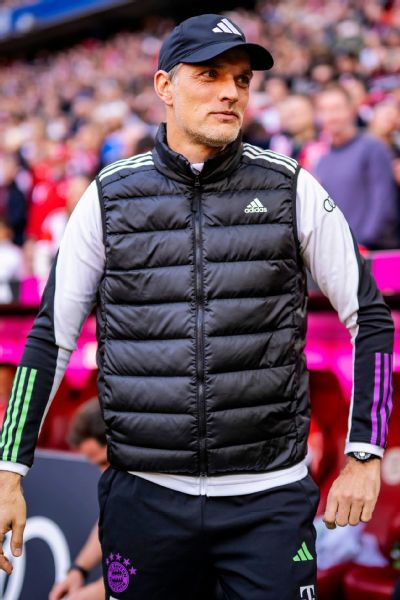
12. THOMAS TUCHEL, 50, Unattached
Coaching acumen: 16/20
Style: 13/20
People management: 13/20
Communication: 13/20
History/achievements: 7/10
X factor: 6/10
Total: 68/100
Another from the long line of Ralf Rangnick disciples, Tuchel is arguably among the most flexible. While Rangnick may have helped Tuchel make his start in management by hiring him as youth team coach at Stuttgart in 2000, Tuchel has always proved to be creative when taking on new projects. And though he comes from a rather dogmatic school of coaching, Tuchel has evolved into a practical leader who does not adhere to a specific framework.
At Mainz, with a lower quality of player at his disposal, he developed a high press and long-ball tactics and took them to fifth in the Bundesliga in 2010-11. When replacing Klopp at Dortmund in 2015, he turned the side into a more possession-based unit -- adapting ball retention as a means of defending rather than for creative measures. Then when he made the step up to manage both PSG and Chelsea, he often resorted to imaginative means, applying a fluid 3-5-2 and pulling the wingers back to open up space for his wing-backs, giving his teams a wider range of attacking threats.
The German led Chelsea to Champions League success in 2021, gaining praise for his innovative training methods, man management and attention to detail. But he struggled with the authority above him at both PSG and Chelsea, particularly around recruitment decisions, resulting in his sacking. Similar issues followed at Bayern, and when he failed to win the title last season, he departed under a cloud with reports he was unable to win over senior players and criticism for his overly cautious tactics ringing in his ears. However, with his experience and nous, he will surely be back in a high-profile role soon.
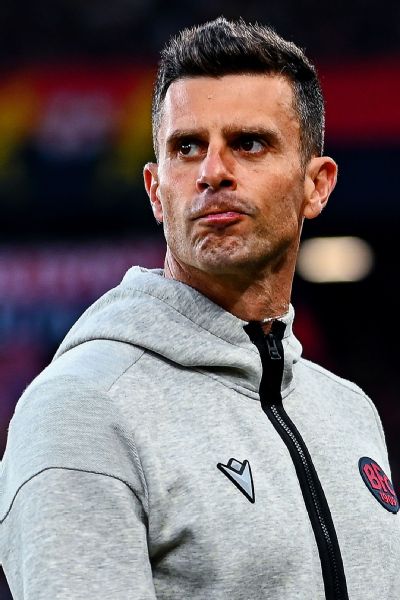
11. THIAGO MOTTA, 42, Juventus
Coaching acumen: 14/20
Style: 14/20
People management: 15/20
Communication: 15/20
History/achievements: 3/10
X factor: 8/10
Total: 69/100
The former Italy, Barcelona, PSG and Inter Milan midfield enforcer has built an admirable coaching reputation in rapid time. Though lasting just two months in his first job at Genoa (2019), Motta then kept minnows Spezia in Serie A for two seasons in a row, and last season led Bologna into their first-ever Champions League campaign.
At only 42, Motta has demonstrated expertise in setting up a well-structured defensive unit, as well as instilling a varied, attacking philosophy that can take charge of games. Furthermore, the Brazil-born boss brings clear principles to his coaching: the roles on the pitch are clearly defined, with repeated patterns recognisable from the training ground.
As a player, Motta was captain at Inter and PSG, so he has taken that natural authority with him into coaching. While his comments about using a 2-7-2 formation to Gazzetta dello Sport were misinterpreted in 2018, he did admit that he wants a "team that controls the game, high pressure and a lot of movement with and without the ball." Now tasked with asserting his authority on the post-Allegri "reboot" at Juventus, it will be interesting to see how he handles the media attention and fan pressure in a job that will likely prove a defining moment in his career.
Frank Leboeuf reacts to Mikel Arteta's spot at number four on ESPN FC's top 50 best men's club managers in Europe.
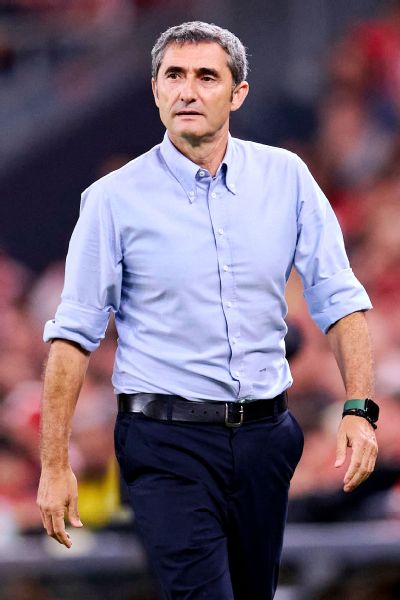
10. ERNESTO VALVERDE, 60, Athletic Club
Coaching acumen: 15/20
Style: 14/20
People management: 16/20
Communication: 14/20
History/achievements: 6/10
X factor: 5/10
Total: 70/100
Valverde might not be one of the most outspoken managers in the game, or one to sing his own praises, but thanks to his 20-plus years in the profession and calm, reflective character, he's one of the most respected. More than anything, the 60-year-old is lauded for the way he communicates with his players. And off the pitch, he's renowned as a quiet intellectual with a love for the arts, photography and music.
Throughout his career, Valverde has won two LaLiga titles at Barcelona (though he was deemed too pragmatic for the Catalans, who sacked him after less than three years) and three Greek championships with Olympiakos. Last season he shepherded Athletic Club -- in his third spell at a club where he also spent six seasons as a player -- to fifth in the league, which was their best finish since 2015-16.
Operating a 4-2-3-1 formation, Valverde prefers a measured approach against the stronger sides, inviting the opposition to keep the ball with the objective of hitting quick transitions when winning it back, whereas Athletic generally take charge of the game against weaker teams.
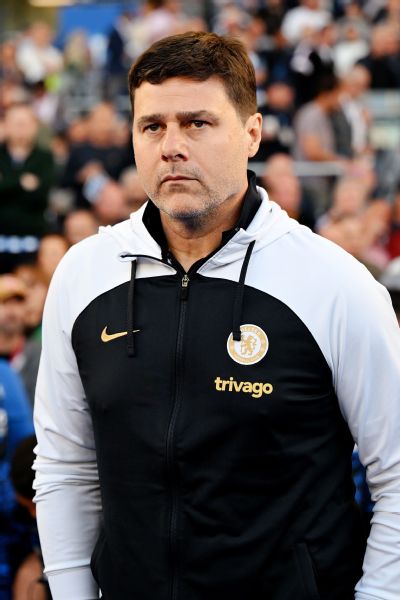
9. MAURICIO POCHETTINO, 52, Unattached
Coaching acumen: 15/20
Style: 14/20
People management: 16/20
Communication: 16/20
History/achievements: 5/10
X factor: 5/10
Total: 71/100
The former Argentina centre-back made his name as a player and coach at Espanyol, then arrived in the Premier League to take charge of Southampton in 2013, before landing the Tottenham job a year later. Though his five years in North London are remembered fondly by the club's supporters, he failed to deliver any silverware -- though taking the club to a Champions League final in 2018-19 should be recognised.
Under his guidance, Spurs took the game to their opponents, pressed with intent in a 4-2-3-1, and were one of the most entertaining sides around. Pochettino raised both the club's standards and image around Europe. However, it's hard to gauge exactly where he now belongs in the managerial landscape.
He won domestic titles with PSG -- no less than expected -- and his Chelsea side had just started to show glimpses of progression when his contract was terminated after a year, but with 14 defeats from 51 games (at a 50.98% win percentage) and a sixth-place finish, questions were raised. Yet with his popularity among players, well-documented ability to inspire young stars and effortlessly natural way with the media, Pochettino's name will always be on the table when a high-profile job becomes vacant.
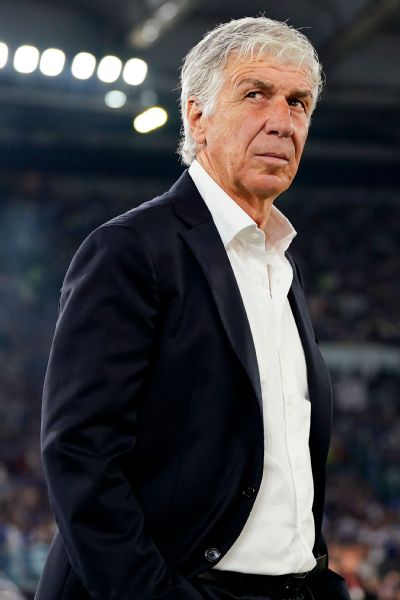
8. GIAN PIERO GASPERINI, 66, Atalanta
Coaching acumen: 18/20
Style: 14/20
People management: 15/20
Communication: 13/20
History/achievements: 6/10
X factor: 6/10
Total: 72/100
Gasperini is set to embark on his ninth season with Atalanta and has performed miracles during his time there. He lifted a side used to midtable mediocrity to fourth in Serie A in 2016-17, then followed that up with three third-place finishes. While Gasperini has had a long career at Juventus (youth teams), Crotone, Palermo, Genoa and Inter Milan, he had never won a trophy until Atalanta picked up the Europa League title in May -- becoming the only team to beat Xabi Alonso's Bayer Leverkusen (3-0 in the final) all season.
An exponent of the 3-4-2-1 formation, his focus on ball retention has dropped in recent years, but Atalanta lead the way when it comes to progressive passes (71 per 90 minutes last season backs this up.)
Gasperini's repetitive, arduous manner -- with movement and patterns of play rehearsed to the most minute detail every single day -- can be overwhelming for some players, especially when it's paired with a strong focus on high levels of fitness. But the results tell their own story.
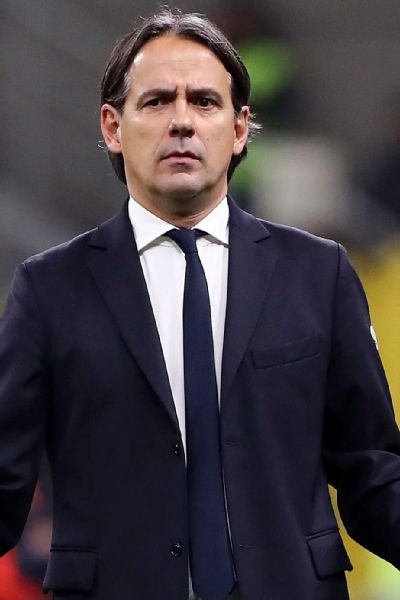
7. SIMONE INZAGHI, 48, Inter Milan
Coaching acumen: 17/20
Style: 14/20
People management: 14/20
Communication: 14/20
History/achievements: 6/10
X factor: 8/10
Total: 73/100
Inzaghi capped the third year of his Inter tenure by winning the Serie A title in the most impressive of manners. Not only did his Inter side score the most goals in the Italian league (89), but also no club in the top five European leagues conceded fewer (22).
With Antonio Conte leaving the club after they were champions in 2020-21, Inter acted smartly to recruit a head coach who represented some of the same basic principles and who had impressed in a five-year spell at Lazio in his first coaching job.
An advocate of the 3-5-2 (or 3-4-1-2) system, Inzaghi has progressively created a robust, highly structured side and instilled an exceptionally strong mentality. Inter are immaculately organised and confident in possession, while the energy of the wing-backs -- Federico Dimarco and Denzel Dumfries -- provides width and attacking supply. The central midfielders often interchange positions naturally, and playing with two centre-forwards also offers Inter's best goal scorer, Lautaro Martínez, extra space to attack. There are few coaches in European football more capable of setting up a well-organised XI.
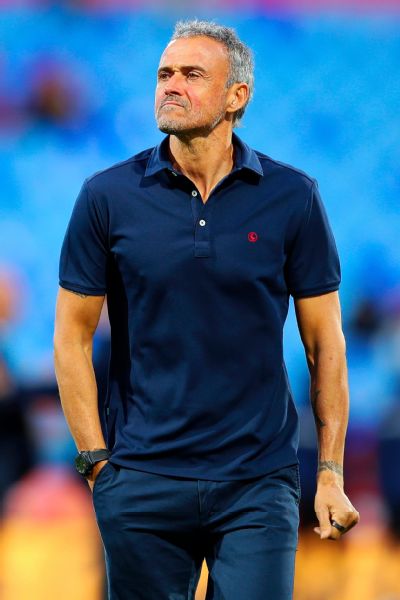
6. LUIS ENRIQUE, 54, Paris Saint-Germain
Coaching acumen: 14/20
Style: 15/20
People management: 17/20
Communication: 16/20
History/achievements: 6/10
X factor: 6/10
Total: 74/100
Though Enrique is lagging behind some of his predecessors in average points per game (2.15), and his 4-3-3 system at PSG has yet to function as seamlessly as it did during his Barcelona days (when he won nine of 13 possible trophies from 2014 to 2017 and was statistically better than Pep Guardiola's side), there's every reason to regard his future with optimism.
PSG have yet to win the Champions League under Enrique, but one year on from his appointment, the club looks in a much healthier state. The stories of players misbehaving have been reduced to a minimum, as has the public perception of an uncontrollable club environment. And while this serenity might also be down to some high-profile departures (such as Neymar, Lionel Messi and Kylian Mbappé), it seems the Parisian giants have finally found a proper figurehead for the first time since hiring Carlo Ancelotti in 2011.
Enrique's style relies on quick transitions from defence to attack, while his focus on the collective over the individual is clear. Big names -- such as Mbappe and Ousmane Dembélé -- have occasionally started on the bench without causing too much upheaval, whereas emerging talents such as Warren Zaïre-Emery, Lucas Beraldo, Senny Mayulu and Yoram Zague are being slowly phased into the side.
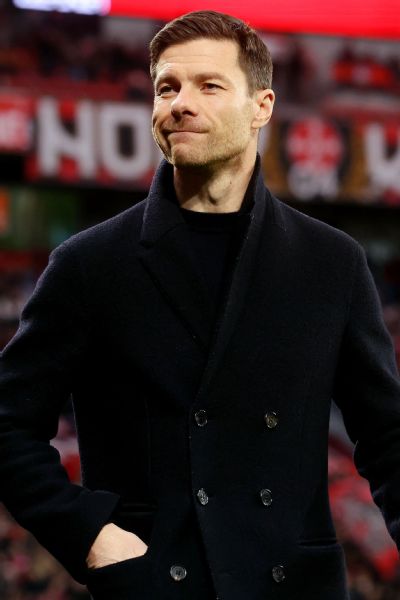
5. XABI ALONSO, 42, Bayer Leverkusen
Coaching acumen: 15/20
Style: 15/20
People management: 18/20
Communication: 15/20
History/achievements: 6/10
X factor: 9/10
Total: 78/100
This is a list of the best managers in the men's club game right now, and based on his first 22 months as a manager, it's hard to do better than the former Liverpool midfield maestro. With only a spell in charge of Real Sociedad's B team behind him, Alonso turned Bayer Leverkusen's fortunes around immediately when he joined in October 2022. He led the club to its first Bundesliga title, the German Cup and a place in the Europa League final in his first full season.
Going unbeaten in 51 games before losing to Atalanta in that European final, Alonso has already performed one of the most spectacular feats in modern football. It's clear he possesses some extraordinary management skills and knows how to command the unwavering trust of his players.
From a tactical viewpoint, he set up a balanced but highly attractive side, based on three ball-playing centre-backs, outrageously offensive wing-backs (Jeremie Frimpong and Alejandro Grimaldo managed an incredible 39 Bundesliga goals and assists between them), a stable core in the middle and forward players who were given license to interchange positions in the final third. The generous and humble 42-year-old could have picked from some of the biggest jobs in Europe this summer -- including former clubs Liverpool and Bayern -- but chose to stay put to continue to hone his craft.
Steve Nicol, Don Hutchison and Frank Leboeuf debate who is the best manager out of Xabi Alonso and Mikel Arteta.
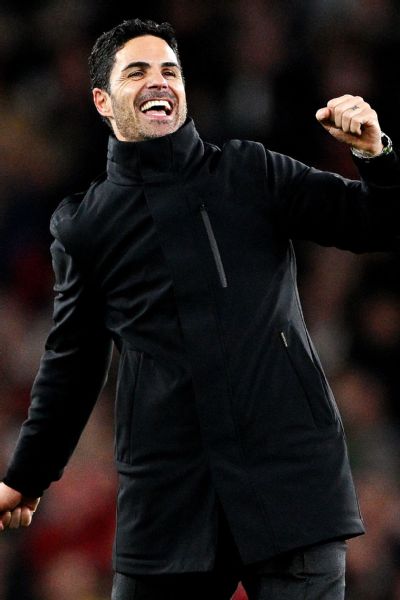
4. MIKEL ARTETA, 42, Arsenal
Coaching acumen: 16/20
Style: 18/20
People management: 18/20
Communication: 16/20
History/achievements: 4/10
X factor: 8/10
Total: 80/100
A fine midfielder in his playing days for the likes of Barcelona, Rangers, Everton and Arsenal, Arteta is the third-longest-serving manager in this season's Premier League. His coaching career development has followed an upward trajectory: Finishing eighth in his first full season, he then took Arsenal to fifth, then came two runners-up finishes which could have resulted in a title but for the relentlessness of his former boss Guardiola and Manchester City.
Aside from one FA Cup victory (2019-20), trophies haven't arrived in abundance, but there has been progress amid the tumultuous state of the post-Wenger era and a rebuilding of the side amid plenty of high-profile exits like Pierre-Emerick Aubameyang and Mesut Özil. And with the third-youngest Premier League squad last season, Arteta has built a clear identity: slightly less possession-heavy than Guardiola's sides, with a more intense pressing game.
While he struggles with the dilemma of "false 9" vs. classic No. 9, Arteta has constructed an outstanding defensive foundation in his 4-2-1-3, which needs only minor tweaks to build upon. During his 4½ years at the Emirates, the Spaniard has mostly kept a cool head and works impeccably in tandem with sporting director Edu.
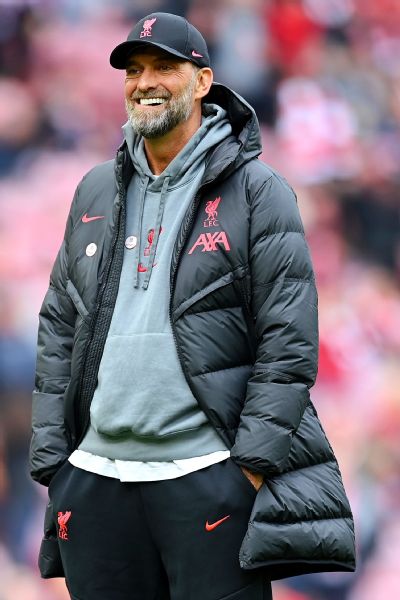
3. JÜRGEN KLOPP, 57, Unattached
Coaching acumen: 16/20
Style: 16/20
People management: 19/20
Communication: 19/20
History/achievements: 7/10
X factor: 8/10
Total: 85/100
Few managers can dream of leaving a legacy like Klopp has at Liverpool. His early successes at Mainz (sealing promotion to the top flight for the first time ever) and Borussia Dortmund (two Bundesliga titles and a UCL final) suggested his class. But he changed everything in nine years on Merseyside, as he famously brought back the league title following a 30-year wait and claimed a Champions League trophy, plus three domestic cups, against a backdrop of rivals who spent roughly double his budget during that time.
Klopp has outstanding motivational gifts, an unwavering trust in his players, and a clear, offensive-minded 4-3-3/4-2-3-1 system that involves an extremely high level of intensity. A key exponent of Gegenpressing, it could be argued that Liverpool could have done with a more patient approach at times. But that's a hard balancing act to execute for a coach whose mantra was all about pounding the opposition. Last season, Liverpool recorded the most shots, corners, crosses, through balls and progressive passes in the Premier League.
Klopp's legacy doesn't stop with silverware, though. With such a charismatic personality and knack for understanding Liverpudlian culture, Klopp won the hearts and minds of fans and players alike. Given his unbreakable ties with the club, it appears a national side is most likely to be his next job.
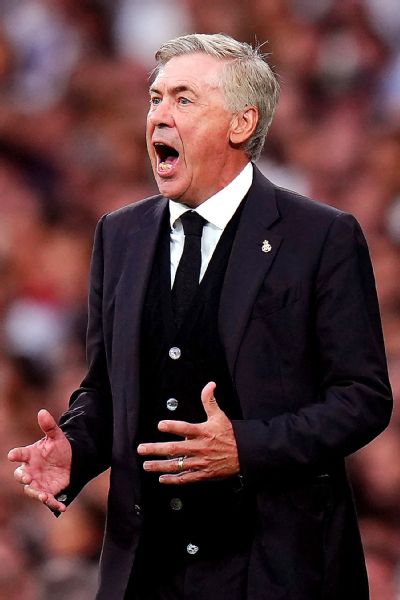
2. CARLO ANCELOTTI, 65, Real Madrid
Coaching acumen: 17/20
Style: 16/20
People management: 20/20
Communication: 17/20
History/achievements: 10/10
X factor: 7/10
Total: 87/100
Beginning his managerial career in 1992, there are few coaches with more experience than Ancelotti. With established clubs like Parma, AC Milan, Juventus, Chelsea, Paris Saint-Germain, Bayern Munich and Napoli on his CV, the Italian has picked up 29 honours in a career with plenty of ups and downs. But when taking the Everton job in 2019, no one would have thought he would be winning the Champions League again with Real Madrid a few years later -- which tells us all we need to know about his resilience.
Some managers, particularly younger ones, try too hard too soon and want to show off their newly acquired cutting-edge ideas. Ancelotti, however, tends to stick to the tried and tested: build the team from the back, put players in their best positions, attack space ruthlessly and allow freedom going forward but without forgetting defensive responsibility. All with the mantra of "trust your players." He also trusts his assistants to execute his plans.
That should not downplay Ancelotti's tactical impact -- the Champions League success in his second spell with Madrid last season proved ample evidence of his shrewdness -- but it shows that successful leadership comes in many shapes and sizes. His "quiet leadership" often sees him achieve more with a raised eyebrow than any screaming and shouting, and it's a skill that hasn't worn off with time.
Management doesn't have to be too complicated if you have the personality to execute it. And this is arguably where Ancelotti finds himself in a class of his own: man-management and extraordinary interpersonal skills (which partly explains why he keeps landing the top jobs in the first place).
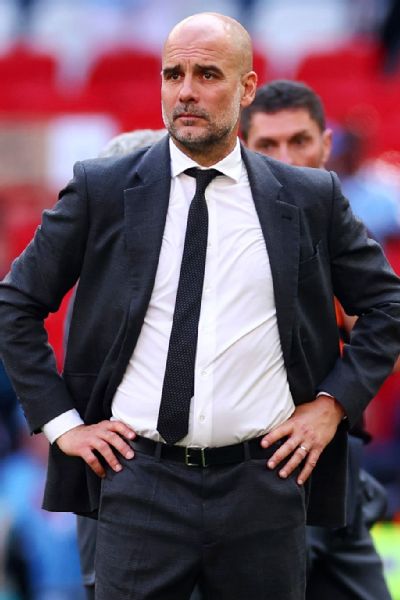
1. PEP GUARDIOLA, 53, Manchester City
Coaching acumen: 18/20
Style: 18/20
People management: 17/20
Communication: 18/20
History/achievements: 9/10
X factor: 9/10
Total: 89/100
As Guardiola enters the last year of his contract at Manchester City, there are few signs that the three-time Champions League winner is running short of ideas or motivation. His failure to break down Real Madrid's lethally efficient counterattack in the Champions League semifinals last season would surely have played on his mind all summer, and how to counter the counter will be on his to-do list for the coming year. Yet none of his peers can match his knack for building sides to the point of them appearing like an organism.
After a successful career as a player, primarily at Barcelona, Guardiola has had the pleasure of exclusively managing recognised top clubs -- Barcelona, Bayern Munich and now City -- with players such as Lionel Messi, Thomas Müller and Kevin De Bruyne at his disposal in the peak of their careers. But that privilege comes for a reason.
Throughout his 16 years as a first-team coach, Guardiola has constantly evolved and reinvented his style -- from going more direct at Bayern, to championing the inverted right-back and centre-back/central midfielder hybrid in England, or even dropping the "false No. 9" for a classic centre-forward in the shape of Erling Haaland -- without ever letting go of his inbuilt Barcelona DNA of attacking, one-touch, possession-based, fluid football.
Obviously the luxury of building teams on high-end budgets helps (although his record of ushering through academy graduates is impressive and often forgotten), but it also creates pressure. And while many other managers have choked under the expectations that huge spending inevitably creates, Guardiola's position is as unassailable as ever.
